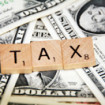Tax Day looms, you may wonder how high the taxman should rank on your list of creditors. Is it better to postpone paying taxes in order to pay off credit card debt, or to keep the electricity running?

Written by Carrie Kirby
Here’s what happens if you’re not able to pay everything you owe to the IRS, as soon as you owe it:
1. You’ll Pay a Penalty
Assuming that you filed your tax return on time but didn’t pay your full tax bill, the IRS will charge you 0.5% of what you owe, every month until you pay, up to 25% of the debt. Therefore, if you still owed $1,000 when you filed your return on April 18, you’ll owe an additional $5 a month.
It’s a very good idea to file your return on time, or file an extension, even if you won’t be able to pay right away — fees increase if you haven’t filed a return by Tax Day. Also, filing on time might get you a break: The IRS says that if you file for an extension or file your return, you may not have to pay the penalty if you’ve paid 90% of what you owe by Tax Day.
2. You’ll Pay Interest
The IRS isn’t going to lend you that money interest-free. The rate on money you owe to the IRS is currently 4%.
3. You’ll Get a Bill
If you haven’t filed your tax return at all, the government will kindly figure out how much you owe for you and send a bill. Actually, not so kindly, because the way they’ll calculate your taxes, you’ll end up owing more than you would have if you’d done them yourself. The government doesn’t have access to all your financial records, so they may not give you credit for your deductions.
Even if you file your return, if you owe money, eventually you’ll start getting mail about it from the IRS.
4. You Could Get a Lien on Your Home
If you don’t pay those bills (or show the IRS they’re wrong and you don’t owe), the next step is putting a lien on your property — usually, your house, if you own one. This tends to happen if you owe $10,000 or more and haven’t worked out a plan with the IRS to pay it off.











Leave A Comment